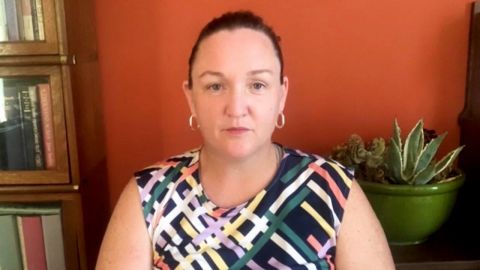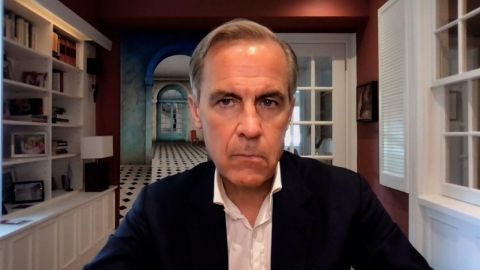Read Transcript EXPAND
BIANNA GOLODRYGA: And now, Democratic congresswoman, Katie Porter, well, she had a crazy idea. The U.S. tax code should treat single parents the same way as
married couples. So, what did she do? Well, she proposed a bill to eliminate the single parent penalty. It’s a move spurred by her personal
experience. She’s a mom of three, and one of the only single parents serving in the House of Representatives. Here she is talking to our Michel
Martin about this and President Biden’s infrastructure bill.
(BEGIN VIDEO CLIP)
MICHEL MARTIN: Bianna, thank you. Congresswoman Katie Porter, thank you for joining us once again.
REP. KATIE PORTER (D-CA): Yes. I’m delighted to be here.
MARTIN: I wanted to start by talking about the Infrastructure Bill. This is obviously an important policy position for the Biden administration and
for many Democrats who support it. The administration has already shaved the proposal back somewhat in an effort to get some buy in from Republicans
who so far are pretty unanimous in resisting the approach that the bill takes.
And I just wanted to get your take on that. I mean, is that the right move by the Biden administration to try to get Republican buy in, even though
the Republican leader, Mitch McConnell, has said that he is 100 percent focused on stopping this administration?
PORTER: We should be definitely having debate with our colleagues from across the aisle about what they think the best path is to putting the
American economy into strong recovery and making it globally competitive for decades to come. There’s something magical about the word
infrastructure, and this bill is about making sure the economy is doing those things, it is strong today and will be strong in the future.
Infrastructures such as bridges and roads are part of that, but those are not the only needs in our economy. We also need to invest in the people who
do the work and in the kinds of industries that we want to see job growth in in the future. It’s not just about getting to that job, it’s about who
watches your family so you can go there, what you get paid when you get there and the kind of work that you do, whether that good job is going to
be there for you for years to come.
With regard to the Republican negotiation, we should absolutely be listening to them, that is core to our democracy. But what we are seeing so
far from Republicans is simply a, we don’t want to. They — it’s — we’re not going to do this, not this amount. Well, what are you willing to do?
What do you think our economy needs? And we’re not hearing those kind of substantive counter proposals back.
So, I think the president ultimately is going to have shown an extremely good faith effort to listen to Republicans, that’s certainly what I am
trying to do here as representative of my district. But ultimately, my job is to put forth policies that are going to help all of the American people
have the economic growth that they need.
MARTIN: Just talk about relationships that you have with other members in Congress. Did you have a sense of whether there are Republicans who
actually do want to negotiate?
PORTER: Well, historically, a lot of these proposals that President Biden is talking about have had strong bipartisan support, infrastructure,
reducing child poverty, making sure we’re investing in good high paying jobs, making sure we’re investing in science and technology, to stay
globally competitive. These have been historic areas of bipartisan support.
But one of the things that I’ve already started to hear, and it’s so disappointing, is, well, the House will flip in just a year and a half. The
House might flip in just a year and a half. Will Democrats hold onto their majority? None of that. No matter what side of the aisle you are on is
relevant to the question before all of us, which is how do we help our economy.
Can the economy wait another year and a half, two and a half, three and a half, four and a half years for us invest in infrastructure? Every day we
wait our infrastructure needs get more difficult and more expensive. So, the fiscally responsible thing to do here is to generate the wins, to put
in place the foundational elements that our economy needs. If that gives winds to Democrats or Republicans, that’s beside the point. The point is,
does it give wins to American workers?
MARTIN: There are two arguments about what’s the way forward for Democrats here. On the one hand, you know, some Democrats say, absolutely. Every
effort should be made to try to get buy in from Republicans on such a sort of a massive investment that will benefit the country overall.
On the other hand, some progressives are getting a little frustrated. They wonder why — they say, this is kind of their point of view, the Democrats
made such a fetish of bipartisanship when Republicans don’t, and that they’re losing the opportunity to make a big statement at a time the
country really needs it. And I would like to ask what your opinion is about that.
PORTER: The point of bipartisanship is that we think it might produce better outcomes because it involves listening to different viewpoints. But
you can get there listening to viewpoints within your district. I represent a district of equal numbers of Democrats and Republicans. I’m not pursuing
bipartisanship for its own sake, I’m pursuing listening and talking to Republican constituents because I represent them, because I learn from
their ideas and perspectives, and because I want to have a chance to think about what they think is best as I move forward to take that vote.
But I definitely think that there cannot be a, we’ll do anything to get Republicans on board. That’s not the goal of bipartisanship. The goal of
bipartisanship is to produce the best possible ideas and the best possible policy outcomes.
So, we should be listening with an ear to, does this make things better? Does this make a stronger bill? Will this strengthen our economy? And if a
Republican has that idea, we should do it. We should not let partisanship stand in our way, but neither is it a goal that stands on its own.
MARTIN: And do you have some deadline in mind by which time the Democrats should move on and perhaps seek to adopt these measures through budget
reconciliation, which is sort of a fancy way of saying, use the budgetary process, like as Democrats did for an earlier relief package (INAUDIBLE) is
not Republic support? I mean, is there a point in which you say, we have to move to a reconciliation? If so, what do you think it is?
PORTER: It’s coming up in the next month or two. We’ve given — nobody else has put forth a proposal. The Republicans have put forth a counter
proposal, the White House has come forward again. I think we’re moving toward being able to say that we are having that debate both within our
districts, with our constituents, but also in Washington. So, I think we’ll start to see more concrete proposals, structure of a possible legislative
package here for the middle or to end of summer.
MARTIN: So, let’s talk about tax policy now. I mean, this is obviously a concern of yours and it’s also a concern of Republicans. As we’ve said, the
minority leader, Mitch McConnell, said that repealing the corporate tax cuts which were adopted under the prior administration is the red line for
Republicans in the Senate specifically. Tax policy is relevant here because tax — changing the taxes is in part how the Biden administration wants to
raise money to pay for some of these investments that the administration wants to make.
So, first of all, I want to hear more about what you say the bias against single mothers or single parents is, and then tell me more about what you
think the direction that the Democrats should head in on this?
PORTER: Yes. So, one of the things that President Biden did with a lot of bipartisan support was pass expanded child tax credit. And so, this is
designed to increase the amount of the child tax credit and have it reach more families.
This recognizes that the cost of raising your child are very difficult for middle class and working families to do both in terms of child care, in
terms of adequate housing, in terms of nutritious food. So, that expanded child tax credit is estimated to cut child poverty in half. And that is an
investment in our future workforce.
But the way it’s structured at present is to phase out eligibility at a much lower income level for people who are single parents than people who
are in married households. And the penalty here might be because someone is a single parent, but who is going to pay the price? It’s going to be the
kids in those single parent households.
So, no child, in my opinion, should get less help in getting that child care and getting that food and getting housing and getting medical care
simply because of the marital status of their parents. So, I have a bill with my colleague, Ayanna Pressley and Don Beyer, to eliminate this so-
called single parent penalty from that expanded child tax credit so we can make sure that all children who need help get it.
MARTIN: What’s the logic of phasing that out at a higher income level for a single parent household What’s the logic of that?
PORTER: Well, the way it works now is married couples begin to phase out at $150,000 in the expanded child tax credit. But a single parent, a head
of household begins to phases out at $112,500. And the answer is, there’s not well-developed policy behind this. It simply is a historic principle,
kind of an idea behind tax policy of you take what’s right for single person, you double it for a married person. And, oh, yes, we’ll chop it in
half for someone who is a single parent, who is a head of household.
For some purposes in tax policy, that might make sense, but for purposes of a child tax credit, there is no help for single parents at the grocery
store or at the daycare center or with nannies. It’s the same cost. And in fact, every bit of research suggests the opposite, that kids in single
parent families often down the income spectrum are more likely to have generally higher risk of worse outcomes. They have more income instability
and more expense instability. So, we should want to do more, not less, for kids in single parent households.
MARTIN: It does make me wonder. We have previously spoken on this program about the way that tax policy has racial implications that perhaps have not
been considered. They may have start out or have been thought of as racially neutral, but, in fact, they advantage specific kinds of
households, households that tend to be formed by white, you know, heterosexual couples where one person makes a great deal more than the
other. That tax policy advantages those families.
And I wanted to ask is there another way in which we could apply racial equity lens to the current situation? I mean, is there a way in which it
also has racial implications that perhaps have not been considered?
PORTER: Well, absolutely. I mean, two-thirds of single parents are women of color. And a lot of policy is rooted and some of the resistance to
changing this policy is coming from ideas about what is the ideal family.
Who or what kinds of families? How do people constitute themselves? And what every child need is a stable, loving parent. And whether that’s in a
two-parent or one-parent households with grandparents, the most important thing is a stable loving parent who is able to meet their needs. And so, we
got to be thinking about our child tax policy that way.
But you’re absolutely right. I mean, one of the reasons that these exist in part because some of these questions and concerns and perspectives are not
being raised. And so, you know, for a long time in our country, there have not been some voices saying, I was raised by a single parent, I am a single
parent. In the 160th congress, I was the only single parent of young children serving (ph) out of 535 members.
And when I began to ask ways and means staff, the tax means staff (ph), why do we do it this way. The response was nobody’s ever asked that question.
MARTIN: You have made quite a name for yourself just by asking questions, I don’t want to say just, because, obviously, that’s what I do too. But
you’ve been asking questions that have just not been asked here before.
For example, recently, you made news again because you were questioning pharmaceutical executives around — one in particular, about a tremendous
increase in cost for a drug that is very necessary for newborns, as I understand it. And you ask, has this cost increase resulted in any
improvement in efficacy of this drug? Has the cost increase diminished side effects in any way? And the answer was no. And I’m just wondering, why it
is that you thought to ask that and nobody else did?
PORTER: Yes. I mean, I think the goal of the hearings is to try to ask the questions that the American people would want to ask. These witnesses are
not just testifying before us as representatives, they’re testifying before the American people. And so, I — you know, I as a person who tries to go
to the pharmacy, and has to sometimes get prescription drugs for myself and my family, they keep saying that these prices are necessary, but why? What
has changed? What has changed?
Is it getting better? Is it getting more expensive to produce? Are your input cost going up? Are the labor costs going up? Are you spending more to
improve the drug? And the answer turns out to be no. And I think it’s just really important sometimes to return to fundamentals and to ask the
questions that I think are really on the minds of the American people as they go about their lives.
You know, the number of times someone says something to me, somebody should do something about this. And I always think to myself. Yes, I’m going to
try.
MARTIN: Well, to that end, you just became chair of the House Natural Resources Subcommittee on Oversight and Investigations, and I understand
that you held your second hearing recently and you invited several CEOs to testify about how their companies use the COVID relief funds, but all three
declined.
PORTER: Yes. Absolutely. So, the CEOs of Devon Energy, ExxonMobil and others refused to come to testify before the oversight and investigation
subcommittee. And one of the things that we need to discuss as part of making energy policy is to what degree are fossil fuel companies creating
good jobs and to what extent do they use resources from coronavirus pandemic relief to, in fact, keep people employed and create good jobs.
And the answer is, we don’t have the transparency that we need into who got PPP loans, for example, what they were used for, why the main street
lending program gave resources. What did the energy companies, fossil fuel companies, who received these loans do with the money? We do not know
unless we ask that question and unless they appear to give that answer. And that money is all of our money, it’s taxpayer investment. What did we get
in return? There may be a very, very good answer to that question but we won’t know because the CEOs refused to come answer it.
MARTIN: The people who are concerned about fiscal integrity would equally be interested in that question, wouldn’t you?
PORTER: We all should be interested in that question because we all want to make sure that our taxpayer dollars are being spent wisely, and that’s
what they were — we are advocates of increasing or decreasing government spending, we all benefit from rooting out waste (INAUDIBLE) abuse and from
understand where these resources go.
And we hope that we are putting COVID-19 and this pandemic in the rearview mirror, but this will not be the last economic instability or the last
recession that our country faces. So, we need to be learning the lessons from how we spent this money, how businesses use money, who applied, who
got help, what did they do with it, what’s the payoff, or we can’t be good stewards of taxpayer resources going forward in terms of addressing any
future economic recessions.
MARTIN: So, before you go, Congresswoman, how do you feel? I mean, do you feel like you’re making any headway? It just seems as though the noise is
louder than ever. I mean, you — I think a lot of people were hoping after the sort of the trauma of January 6th, you know, mob attack on the capitol,
people died, it was an extremely traumatic event for the country, not just for the city and not just for the Congress, but for the country.
And yet, it seems that there’s disagreement over whether there’s going to be a commission to investigate this or not. I mean, if you feel there’s any
way in which the body is — the Congress is actually kind of moving in the same direction on anything?
PORTER: Yes. I actually do think we are moving in the same direction on some things. And I think some of what looks like — you know, we talked
about debate over infrastructure. Well, on one hand, you could say, well, that debate, is that really going anywhere? Are you going to get to
agreement?
But the flip side is, we are debating. We are talking about infrastructure. We are trying to figure out what to do, and that is a good thing. We are
talking about some of these things. We are moving bills to the floor. We are starting to have this discussion. And we have a very divided
government. It is very close majorities in both the House and the Senate. So, a lot of — this is going to be more deliberate. And it’s going to
involve more conversation and more trying to get to a place of compromise. But it’s not necessarily a bad thing.
But I do feel like we are making progress. And I think a lot of that is due to President Biden and the leadership that he has provided around putting
forward strong plans, his willingness, his steadfast willingness to listen to Republicans, to want to work across the aisle. But ultimately, to being
committed to delivering help to all American people.
And if Republicans want to help with that project, we would love to have them. And if they don’t want to help the American people, then that’s what
we have to go ahead and do. And I think we’ve — I personally benefitted from watching Joe Biden — President Biden take that attitude and have
those constructive conversations with both the American public and with leaders of both parties.
MARTIN: Congressman Katie Porter, thank you so much for talking with us today.
PORTER: Thank you.
About This Episode EXPAND
The EU has imposed new sanctions and cut aviation links to Belarus.
LEARN MORE



